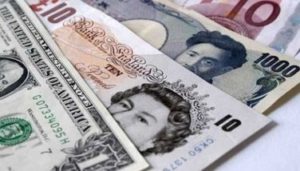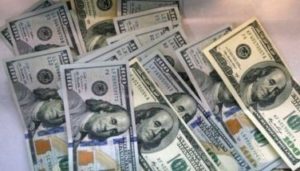ASEAN-BIZ MARKETS | Asia shares rise, dollar underpinned by elevated bond yields
Cars travel past a display showing Shanghai and Shenzhen stock indexes near the Shanghai Tower and other skyscrapers at the Lujiazui financial district in Shanghai, China, on Feb. 5, 2024. (Reuters/Xihao Jiang)
.
.
.
Asian stocks edged up on Tuesday, though moves were subdued in a holiday-curtailed week, while the greenback held near a two-year high helped by elevated US Treasury yields as investors prepared for fewer Federal Reserve rate cuts in 2025.
.
After a recent run of central bank decisions, this week is much quieter, with Japan’s October meeting minutes and Australia’s December minutes released on Tuesday morning, providing more details on their decisions to hold rates at the time. There are no Fed speeches and US data is of secondary importance.
.
Otherwise the themes were largely the same, with the dollar’s strength a burden for commodities and gold.
![]()

Ads by:
It is also a headache for emerging market countries from Brazil to Indonesia that are having to intervene to stop their currencies from falling too far and stoking domestic inflation.
.
MSCI’s broadest index of Asia-Pacific shares outside Japan rose 0.35 percent early in the session, tracking Wall Street’s overnight gain.
.
Japan’s Nikkei fell 0.37 percent, while the broader Topix ticked down 0.03 percent.
.
The Committee on Foreign Investment in the United States (CFIUS) has told the White House it is unable to reach a consensus on national security risks involved in Nippon Steel’s bid for US Steel, the Washington Post reported on Monday.
. Ads by:
Ads by:
Shares of Nippon Steel last traded 1.5 percent higher.
.
Also in Japanese companies news, Honda’s stock price surged nearly 17 percent, while that of Nissan’s eased 0.07 percent.
.
The two are in talks to merge by 2026, they said on Monday, a historic pivot for Japan’s auto industry that underlines the threat Chinese electric vehicle makers now pose to the world’s long-dominant legacy car makers.
.
In China, the CSI300 blue-chip index rose 0.5 percent, while the Shanghai Composite Index advanced 0.47 percent.

Ads by:
Hong Kong’s Hang Seng Index jumped 0.7 percent.
.
Still, investors remain cautious on the outlook for the world’s second-largest economy as it continues to battle a stuttering recovery despite Chinese leaders pledging more support.
.
“China faces significant challenges entering 2025. The ongoing real estate crisis has shattered consumer confidence while a potential trade war with the United States could trigger the worst growth slowdown in decades,” said Ronald Temple, chief market strategist at Lazard.
.
“Investor expectations have been raised and dashed more than once in China in recent years, and 2025 may prove to be no different. China’s economic and market outlook might largely depend on the speed and magnitude of government reforms.

.
Ads by:
” In the broader market, expectations of fewer US rate cuts in 2025 remained top of investors’ minds.
.
Markets are now pricing in just about 35 basis points of easing for 2025, which has in turn sent US Treasury yields surging and the dollar to new highs.
.
The two-year Treasury yield last stood at 4.3345 percent, while the benchmark 10-year yield steadied near a seven-month high at 4.5825 percent.

.
Ads by:
“Like markets, the Fed will need to consider US policies on tariffs and immigration in its inflation and growth outlook. We believe the subtle slowing in the US labor market will still be the Fed’s paramount concern,” said analysts at Citi Wealth.
.
“While always uncertain, our base case expectation for a 3.75 percent policy rate is unchanged. It’s a far cry from the 1.7 percent US policy rate average of the past 20 years.”
.
Ahead of US President-elect Donald Trump’s return to the White House in January, global central banks have urged caution over their rate paths due to uncertainty on how his planned tariffs, lower taxes and immigration curbs might affect policy.
.
Data on Monday showed US consumer confidence unexpectedly weakened in December as the post-election euphoria fizzled and concerns about future business conditions emerged.

.
Ads by:
In currencies, the dollar index held near a two-year high at 108.11, having climbed more than 2 percent for the month thus far.
.
The euro eased 0.04 percent to $1.0401, while the yen languished near a five-month low at 157.11 per dollar.
.
Japan’s Finance Minister Katsunobu Kato on Tuesday reiterated Tokyo’s discomfort over excessive foreign exchange moves and put speculators on notice that authorities are ready to act to stabilize a faltering yen.
.
The strong dollar combined with high bond yields to weigh on gold, which stood at $2,615.59 an ounce after slipping 1 percent last week.
.
Oil prices edged higher, with Brent crude futures rising 0.37 percent to $72.90 a barrel, while US crude gained 0.35 percent to $69.48 per barrel..
Rae Wee (Reuters)
Singapore
Tue, December 24, 2024
.
Ads by:


 Memento Maxima Digital Marketing
Memento Maxima Digital Marketing







